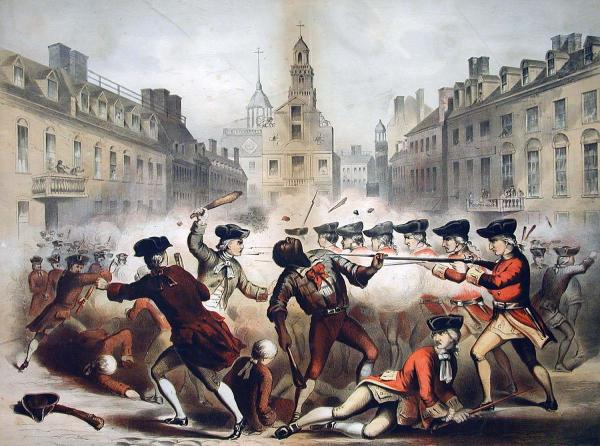As we struggle to heal from the Boston Marathon attacks, we might start by returning to our roots. Our nation was born out of the devastation of another Boston massacre, and our Founders’ response might serve as a guide.
During the first Boston massacre in 1770, British troops fired on Bostonians, killing 5 civilians. America’s reaction was a same: solidarity. In both attacks, the survivors did not flee in terror as one might expect. Instead, bystanders poured into the streets, eager to aid the fallen. After helping the injured, in 1770 as well as 2013, the public concern and compassion were quickly replaced by demands for justice and retribution. With the stunning capture of Dzhokhar Tsarnaev among the chants of “USA!” that filled the streets of Watertown, Massachusetts, we may have made dramatic strides towards unraveling the full extent of the plot.
Now we are at a crossroads. We need to aggressively hunt down any further threats – whether they be foreign or homegrown – and simultaneously remain careful not to slide into an Orwellian state where Big Brother’s drones monitor unwitting Americans and rain missiles upon citizens on U.S. soil. United in the aftermath of the bombing, we might learn from the course of our Founders and try to move towards a better future, or otherwise allow the incident to shake and separate us as we continue the divisiveness that has marred our politics. The Founders provided a model for how we might best defend against foreign threats while still guarding our liberties at home.
To Americans of the 1770’s, the Boston Massacre became a rallying cry for liberty. Along with other British provocations, it led the nation to examine the rights of mankind and fight – together – to defend them. As John Adams wrote, the “foundation of American independence was laid” on the night of the massacre. He personally fought against the public cry for vengeance against the British perpetrators without a trial. Although his success in affording the redcoats due process was unpopular at the time, Adams saw the importance of preserving liberty while simultaneously fighting to secure it for posterity. The tragedy – and Americans’ commendable restraint following – helped to unite the country.
Once war broke out, Washington led the way. He did not win the Revolution by being a brilliant tactician – he lost more battles than he won. He did not become the “Father of our Country” by being a grand orator – his dentures garbled his speech. But America did not – and perhaps does not now – need genius tactics or big words. What Washington did was unite the divided country and inspire Americans to work together for the betterment of the United States. In the wake of tragedy and devastation, he worked tirelessly to defend his people and rebuild, together.
Washington began by securing our safety against foreign combatants. But however fiercely Washington acted to defend his nation from foreign threats, he never trampled Americans’ rights. The Revolution had elements of a civil war, with approximately 20% of the population sided with Britain. Despite this homegrown threat to Independence, Washington refused to allow emergency to erode Americans’ liberties. James Madison wrote, “Crisis is the rallying cry of the tyrant,” and Washington was certainly no tyrant. To the astonishment of many of the era, he treated the Loyalists as a within the larger American society.
While Washington exercised vast powers in dealing with enemy combatants, he was conscious of his limitations when it came to impinging on the rights of fellow citizens. Americans were to be protected and their liberty cherished. He would not allow questions of a neighbor’s patriotism to be used as pretext for unjust incarceration or death. Despite the nation teetering on verge of bankruptcy, he refused to take people’s property. Washington saw American rights as sacrosanct.
In describing the character of the United States, Washington wrote, “Liberty is the Basis, and whoever would dare to sap the foundation, or overturn the Structure, under whatever specious pretexts he may attempt it, will merit the bitterest execration, and the severest punishment which can be inflicted by his injured Country.” Liberty was the battle cry of the Revolution, and Washington guarded it, ruthlessly. So too in seeking to address the aftermath of the Boston Marathon attacks and working to prevent future threats, we must be on guard against proposals that would in the name of greater security trample on civil liberties of American citizens.
Last Monday, Massachusetts celebrated Patriot’s Day marking the 238th anniversary of the “shot heard round the world” that started the American Revolution. In that and subsequent battles, Bostonians triumphed, ultimately leading the rest of the nation to follow suit in fighting for independence. The triumph was followed by long years of struggling to maintain order and liberty. It is a struggle analogous to that which we face today, in the sense that we too must strive to strike an appropriate balance.
We can never fully recover from the lives lost, we can only do our best to better the world they so tragically left behind. Following the first Boston massacre, together we defended ourselves from grave danger without losing sight of our principles. Back then, we came together to confront our many perils, from foreign foes to domestic traitors, from a fractious Congress to a crushing national debt. We have conquered these problems before, fiercely defending ourselves without losing sight of our own liberties. We did so by following Washington’s leadership. It is a good thing he took great notes.
Logan Beirne is an Olin Scholar at Yale Law School and the author of Blood of Tyrants: George Washington & the Forging of the Presidency (Encounter Books, April 2013). This post also appears on Constitutional Sources Project.









